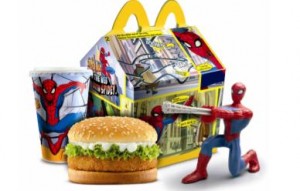Child obesity and unhealthy eating habits is a pressing issue in today’s society. Children’s diets that consist of high calorie counts, trans fats, and not enough fruits and vegetables are making them more susceptible to health risks at a young age. Many factors can be named as a cause of children’s poor food choices, however there is an evident positive correlation between food marketing and the ever-increasing rates of unhealthy weight in children.
Children are bombarded with advertisements everyday on television and the radio, and even more so through apps, social media and the Internet with our progressive technological society. However when did it become acceptable to use promotional characters to lure children into unhealthy eating habits that have such negative effects on their health?
A company known for enticing children using promotional characters and toys is McDonald’s. In 1963, the multi-billion dollar company strategically introduced the famous Ronald McDonald into their marketing plan. Anticipating the positive emotions children would associate with the company after creating such a character, the company was very quickly able to develop a large child customer base and brand loyalty. Furthermore, since 1979 McDonald’s has included an  attractive toy with every Happy Meal purchased. Allow me to remind you that every Happy Meal “contains half a day’s worth of calories and saturated fat, along with nearly a day’s worth of sodium, and two days worth of sugar.” Whether it’s a Spiderman figurine or a Hello Kitty watch, surely risking the health of young children is not worth it. In recent years McDonald’s has promised to advertise meals to children that include apple dippers and milk in place of fries and soda. Yet a recent study conducted by the Center for Science in Public Interest (CSPI) found that when Happy Meals are ordered, 93% of the time they are automatically given fries, and 78% of the time they are offered soda first.
attractive toy with every Happy Meal purchased. Allow me to remind you that every Happy Meal “contains half a day’s worth of calories and saturated fat, along with nearly a day’s worth of sodium, and two days worth of sugar.” Whether it’s a Spiderman figurine or a Hello Kitty watch, surely risking the health of young children is not worth it. In recent years McDonald’s has promised to advertise meals to children that include apple dippers and milk in place of fries and soda. Yet a recent study conducted by the Center for Science in Public Interest (CSPI) found that when Happy Meals are ordered, 93% of the time they are automatically given fries, and 78% of the time they are offered soda first.
It is undeniably unethical to direct this food marketing strategy towards young minds that are not yet capable of making good judgments; and as Michael F. Jacobson, the executive director of CSPI said, “regardless of the nutritional quality of what’s being sold, the practice of tempting kids with toys is inherently deceptive.”
Article Sources:
McDonald’s Faces Possible Lawsuit Over Fast-Food Marketing to Kids
Tell McDonald’s: Stop Using Toys to Market Junk Food to Kids
